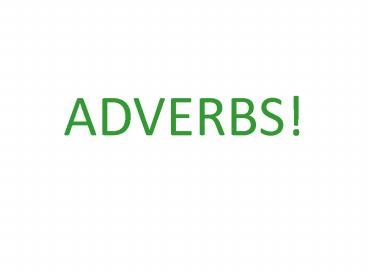ADVERBS! - PowerPoint PPT Presentation
1 / 10
Title:
ADVERBS!
Description:
Amazingly is an adverb because it is modifying the adjective ... adverbs Comparative adverbs Superlative adverbs Degree of comparison Comparative and ... – PowerPoint PPT presentation
Number of Views:243
Avg rating:3.0/5.0
Title: ADVERBS!
1
ADVERBS!
2
What is an adverb?
- An adverb is a word that modifies a verb, and
adjective, or another adverb. - Explorers eagerly chase adventure.
- Eagerly is an adverb because it is modifying the
verb, chase. - Some explorers visit amazingly beautiful places.
- Amazingly is an adverb because it is modifying
the adjective, beautiful. - Others quite bravely explore the unknown- space.
- Quite is an adverb because it is modifying the
adverb, bravely, which is modifying the verb
explore.
3
Adverbs answer
- Adverbs answer the questions how, when, where, or
to what extent. - - How? suddenly, carefully, sadly
- - When? now, later, soon
- - Where? there, up, ahead
- - To What Extent? completely, totally, fully
4
Location, location, location
- Adverbs can appear in different positions in
sentences. - The tourists boarded the bus eagerly. (after the
verb) - The tourists eagerly boarded the bus. (before the
verb) - Eagerly, the tourists boarded the bus. (at the
beginning)
5
More on adverbs
- Adverbs that modify adjectives or other adverbs
usually come directly before the words they
modify. They usually answer the question to what
extent. - Marco Polo told really wonderful tales of China.
- Really modifies the adjective, wonderful.
- People were very eager to hear his stories.
- Very modifies the adjective, eager.
- They nearly always hung on every word.
- Nearly modifies the adverb, always.
6
Forming adverbs
- Many adverbs are formed by adding the suffix, -ly
to the end of an adjective. Sometimes the
spelling of the base word changes when ly is
added. - Near add ly to make it an adverb- nearly
- Gentle drop the e and add ly to make it an
adverb- gently - Easy change the y to i and add ly to make it an
adverb- easily
7
Comparative adverbs
- The comparative form of an adverb is used when
you compare a person or thing with one other
person or thing. - He finished sooner than she did.
- If the adverb has one syllable, add an er to
make it comparative. - slow slower
- soon sooner
- If the adverb has two or more syllables, add more
to the beginning to make it comparative. - calmly more calmly
- briskly more briskly
8
Superlative adverbs
- The superlative form of an adverb is used when
you are comparing a person or thing with more
than one other person or thing. - He is the quickest of the three boys.
- If the adverb has one syllable, add an est to
make it superlative. - slow slowest
- soon soonest
- If the adverb has two or more syllables, add most
to the beginning to make it superlative. - Calmly most calmly
- Briskly most briskly
9
Degree of comparison
- Use only one sign of comparison at a time.
- Do NOT use more and er together or most and est
together. - Incorrect That beach has the most whitest sand.
- Correct That beach has the whitest sand.
10
Comparative and Superlative
- The comparative and superlative forms of some
adjectives and adverbs are completely different
words - good, better, best
- bad, worse, worst
- well, better, best
- much, more, most
- little, less, least































